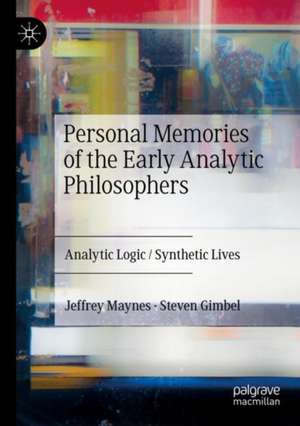Personal Memories of the Early Analytic Philosophers: Analytic Logic / Synthetic Lives
Autor Jeffrey Maynes, Steven Gimbelen Limba Engleză Paperback – 2 sep 2023
| Toate formatele și edițiile | Preț | Express |
|---|---|---|
| Paperback (1) | 722.02 lei 6-8 săpt. | |
| Springer International Publishing – 2 sep 2023 | 722.02 lei 6-8 săpt. | |
| Hardback (1) | 726.31 lei 6-8 săpt. | |
| Springer International Publishing – sep 2022 | 726.31 lei 6-8 săpt. |
Preț: 722.02 lei
Preț vechi: 880.52 lei
-18% Nou
Puncte Express: 1083
Preț estimativ în valută:
138.16€ • 144.54$ • 114.77£
138.16€ • 144.54$ • 114.77£
Carte tipărită la comandă
Livrare economică 02-16 aprilie
Preluare comenzi: 021 569.72.76
Specificații
ISBN-13: 9783031127090
ISBN-10: 3031127099
Ilustrații: XV, 194 p.
Dimensiuni: 148 x 210 mm
Greutate: 0.28 kg
Ediția:1st ed. 2022
Editura: Springer International Publishing
Colecția Palgrave Macmillan
Locul publicării:Cham, Switzerland
ISBN-10: 3031127099
Ilustrații: XV, 194 p.
Dimensiuni: 148 x 210 mm
Greutate: 0.28 kg
Ediția:1st ed. 2022
Editura: Springer International Publishing
Colecția Palgrave Macmillan
Locul publicării:Cham, Switzerland
Cuprins
1. Maria Reichenbach.- 2. Claude Grelling.- 3. Douglas Quine.- 4. Olaf and Maggie Helmer.- 5. Felix and Shulamith Oppenheim.- 6. Peter Achinstein.- 7. Ruth Anna and Hilary Putnam.- 8. Elizabeth Austin.- 9. Hannah Thost.- 10. Franz Alt.- 11. Nicholas Rescher.
Notă biografică
Jeffrey Maynes is Associate Professor of Philosophy and Chair of the Department of Philosophy at St. Lawrence University in Canton, New York. Among his publications are “On the Stakes of Experimental Philosophy,” (Teorema, 2017), “Critical Thinking and Cognitive Bias” (Informal Logic, 2015), and “Linguistic Intuitions” (Philosophy Compass, 2013, with Steven Gross).
Steven Gimbel is Professor at Gettysburg College where he held the Edwin T. and Cynthia Shearer Johnson Chair for Distinguished Teaching in the Humanities. He is author or editor of eight books including Isn’t that Clever: A Philosophy of Humor and Comedy (Routledge, 2017), Einstein: His Space and Times (Yale, 2015), and Einstein’s Jewish Science (Johns Hopkins, 2012). He has four video lecture series in The Teaching Company’s series The Great Courses, including Redefining Reality: Intellectual Implications of Modern Science (2015) and The Great Questions of Philosophy and Physics (2020).
Steven Gimbel is Professor at Gettysburg College where he held the Edwin T. and Cynthia Shearer Johnson Chair for Distinguished Teaching in the Humanities. He is author or editor of eight books including Isn’t that Clever: A Philosophy of Humor and Comedy (Routledge, 2017), Einstein: His Space and Times (Yale, 2015), and Einstein’s Jewish Science (Johns Hopkins, 2012). He has four video lecture series in The Teaching Company’s series The Great Courses, including Redefining Reality: Intellectual Implications of Modern Science (2015) and The Great Questions of Philosophy and Physics (2020).
Textul de pe ultima copertă
Analytic Philosophy began in the first decades of the 20th century at Cambridge with Bertrand Russell, in Vienna with the Vienna Circle of Logical Positivists, and in Berlin with Hans Reichenbach’s Society for Empirical Philosophy. While the story of the rise of this intellectual movement is chronicled in a number of recent and not so recent books, these treatments largely focus on the story of the ideas. Largely missing are the figures themselves, their lives and personalities. Those are saved in the memories of the people who knew them. Analytic Logic/Synthetic Lives is a collection of eleven edited transcripts of oral history interviews collected over twenty years with those who had such memories – the widows, spouses, classmates, and students of these towering figures of 20th century analytic thought. The primary and secondary scholarly literature on the history of early analytic philosophy is plentiful, but the same is not true when it comes to the personal side of these figures. This volume fills that hole by collecting personal remembrances from those who knew them best.
Caracteristici
Interviews people who knew canonical figures both personally and professionally Sheds insight on the work and life of major figures including Russel, Reichenbach, Quine, Carnap, Ayer, and Austin Details some of the personal and professional impacts of Nazi persecution on early analytic philosophers
